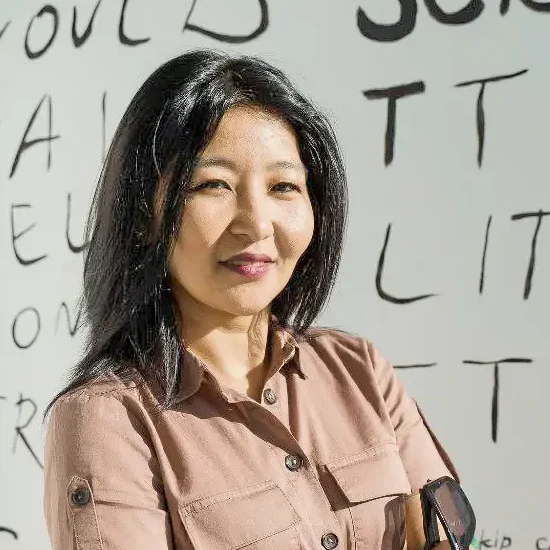This project has become very important to me. Because I sincerely believe that if every person does one small good deed, the world will become much better place.
— How did you find out about the Angels of Freedom? And why did you think it was important for you to be involved in the project?
— It was the end of July last year. I just happened to have a word or two with an acquaintance, he sent me the link and I donated. Then I went further and saw that there were several ways to help. First of all, it was the first time I heard what toloka was. It turns out that tolokas have been around for a very long time. In the past, they were organized in villages, when peasants worked together to help someone who couldn’t do something alone [for example, to cut down a place for a new house for a a person whose house has burned down — editor’s note]. I found that very interesting! You help someone in your life anyway — with money somewhere, with deeds somewhere. If you help with money, it’s one thing, but if you help with your work, with your hands, you feel you’re making a greater contribution. In my opinion. Such a small accident led me to the project and I stayed in it. Last year I abstracted away from a lot of news, but there was a query — how to help Ukrainians in general. And somehow the “on-demand” came by itself. This project became very important to me. Because I truly believe that if every person does one small good deed, the world will become a much better place.
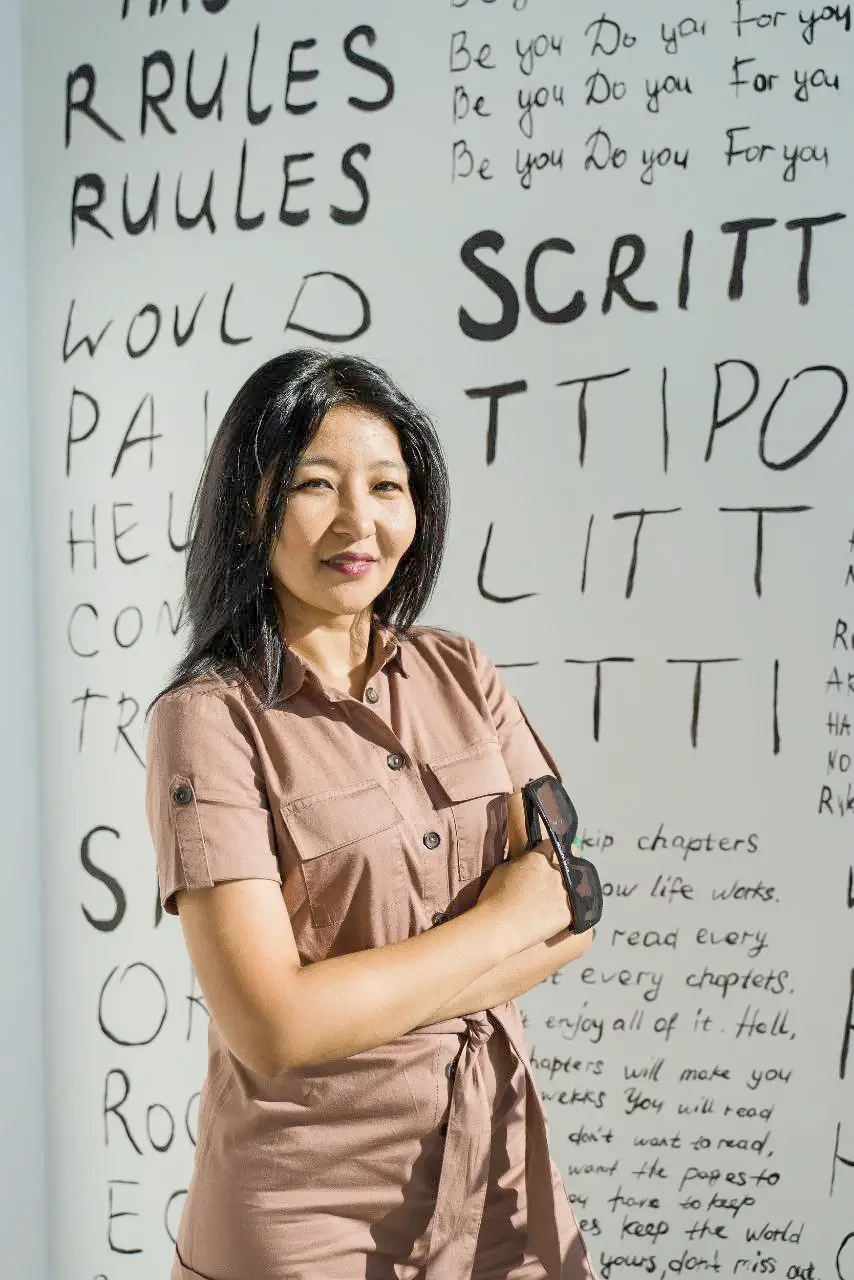
— How did you take the news of the outbreak of war?
— To be honest, I couldn’t believe it for a long time. There was so much confusion in all the news stories. For me, the news came as a genuine shock. And, of course, I hoped to the last that it was not true at all, some kind of information dump. That is, there was no understanding of the situation, how could it even be. It was very difficult for me, and the only way out was just to abstract away from all the news. Although I have no relatives, friends or contacts in Ukraine as such. But I could never have imagined that two countries, brotherly and close to us, would start fighting each other.
— How long did this period of rejection of the situation last?
— The shock lasted four or five months. And last summer it became clear that the war was not just there, but that it would last a long time — more than a year, most likely. And, I guess, after the adoption the project itself came.
— But for many people it is the news that becomes the trigger to go and help, because people see the destruction, see the pain of other people, the horror that is going on there now. What was the trigger for you?
— I just have this principle in my life: if I see some kind of injustice, if I see that someone needs help, I can’t pass by. At first, I just didn’t know how to help. But when I found out, I got actively involved. Besides, there are so many sincere people in the project. When you meet them — some from Ukraine, some from Russia — you realize “this is it, it’s real” [the war — editor’s note]. And you get a feeling for these people, seeing how they are rooting for the common cause. It becomes impossible to stand aside.
— What was your first impression of toloka?
— When I came, there weren’t many of us. But I liked that people were involved in the process. Everyone was smiling and friendly. Although we gathered, as they say, not because of a good event. People kept a positive attitude and that’s the most important thing. With each “angel” that you make, you become more and more confident that you can help this world — make it a little brighter and kinder. The hope grows bigger with every angel. And it’s important to me that I am a part of it — at least a little bit, at least a part of me can be sent with an “angel.”
Angels of Freedom — it is light, it is goodness, it is hope and faith. And sincerity. Those who come to us are very sincere people, very sincere.
— What do people talk about most often at tolokas?
— It differes. Planning for the future, sharing who’s from where, what great places they’re from, what an interesting life they have, let’s say. Some share their impressions of Kazakhstan (those who relocated). This, one might say, is also a cultural exchange. Even though we speak the same language, there are still cultural differences. We have our own beauty in Kazakhstan, we have our own in Ukraine, different terrain, different traditions.
— It is unusual that in Kazakhstan, people from two warring states find common ground by making “angels”.
— Yes, it is amazing! But Kazakhstan has always been a friendly, peaceful and hospitable country. In this respect, I believe we’ve never had a problem with anyone labeling anyone as a “bad” nationality. We do not have “negative” people coming to our tolokas, we have everyone who is open and ready to help. And all kinds of people come: of different ages (there are schoolchildren, students and older people), different professions and of different social status. Despite the differences, there is a feeling that we are all equal there and we are all united by one goal — to help. That is, to do everything you can to make as many people as possible know about us, to make as many beautiful “angels” as possible, to fill this project with your positive energy and to fill ourselves with it.
— In what mood do you leave a toloka?
— I am already happy to come to tolokas. Because I know that I can spend my time doing something useful. The toloka is a such occupation that you know that you’re not living your life in vain. You can teach something and learn something yourself. After the toloka, you go out probably one or two levels happier, with the satisfaction of having done one good deed today.
— What do you do in the project?
— I am an ordinary volunteer — I go to fairs, I take part in tolokas. We recently went to our first toloka in Shchuchinsk. It was a very interesting experience. Everything went off without a hitch. The atmosphere was friendly, and the “angels” were quickly made.
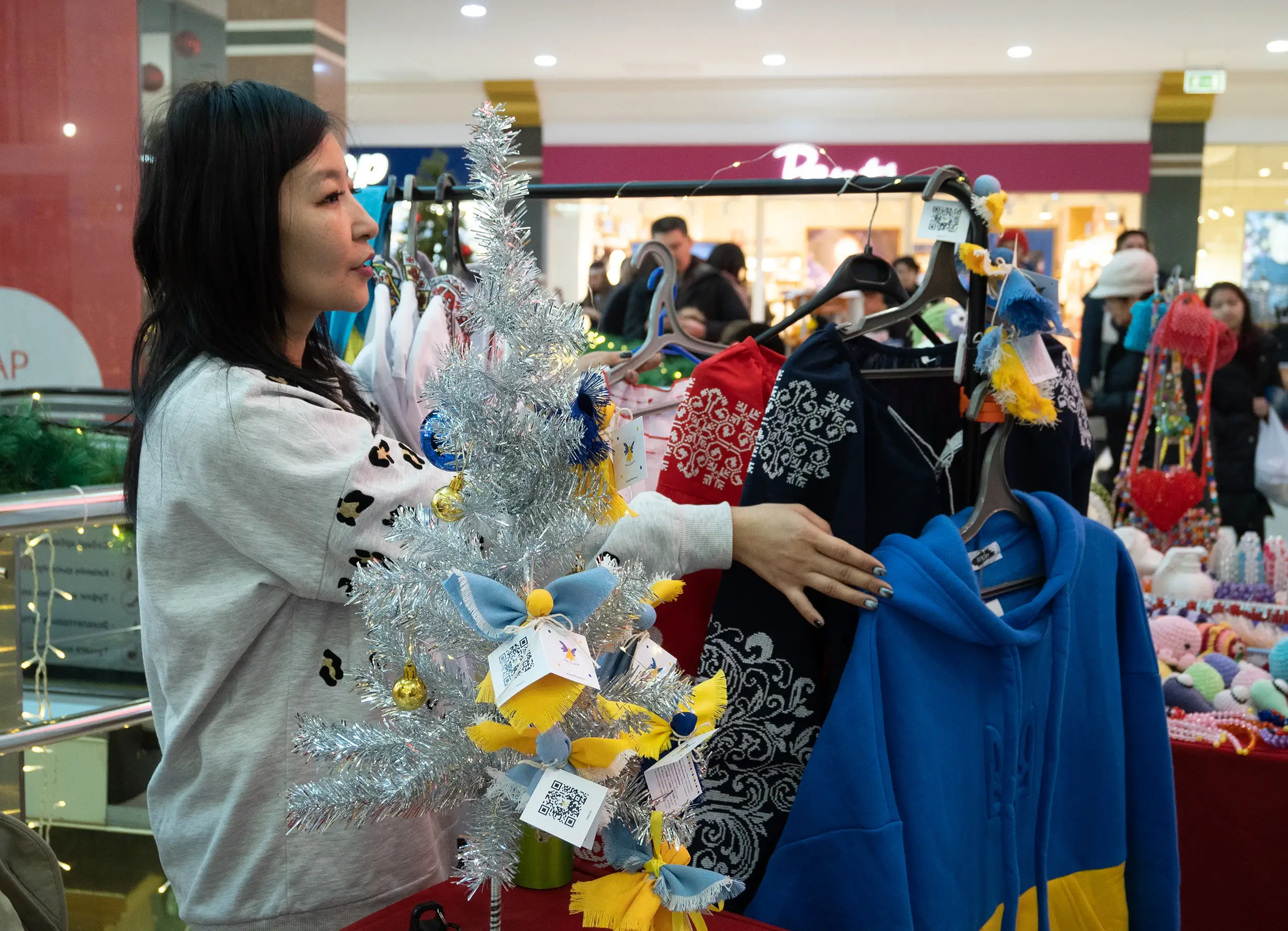
— How many people came?
— I don’t remember exactly. Probably about 15 people. But Shchuchinsk has a small population, besides there wasn’t much advertising. So for the first time, I think this is a very good result. People have picked up the idea, they want to continue to hold tolokas, and that’s very encouraging.
— Why did you want to get involved in rebuilding schools? Why is this particular type of help closer to your heart?
— I think it is important to give people who are in the war zone hope and faith. I think our project does just that. There are very complicated processes involved here. Humanitarian aid was needed at first, as an emergency. In addition, sending shipments takes time and requires extra money. And the restoration of schools gives hope for a peaceful life — both for children and parents. Can you imagine, children sit at home, the Internet works irregularly, the light sometimes does not work, they cannot study or communicate normally, parents cannot go to work because they cannot leave their children home alone. God forbid something happens, who will look after them, who will take them to the bomb shelter? At school, on the other hand, children are communicating and learning in conditions close to normal. I think this is very important for children. Then Ukrainians have hope: even if there is the war, it is not a reason to stop developing, not a reason to stop rejoicing. The rebuilding of schools and kindergartens is already showing some growth.
— Is volunteering difficult or easy for you?
— Not to say that it was extrimely difficult. But there were these little inner hurdles related to going to fairs. Because ever since I was a kid I don’t like to be in the public eye. But as it turned out, in principle it is not difficult. The main thing is to try it, at least once. We have volunteers to help. You are not on your own. You can always ask more experienced participants and they will help you. No one is greedy for information. Here we have Aelita, I stood with her for the first time at the fair. She always gives you confidence because she is a very communicative person. You just watch other volunteers and learn. Even if you are the shyest person, it’s all surmountable.
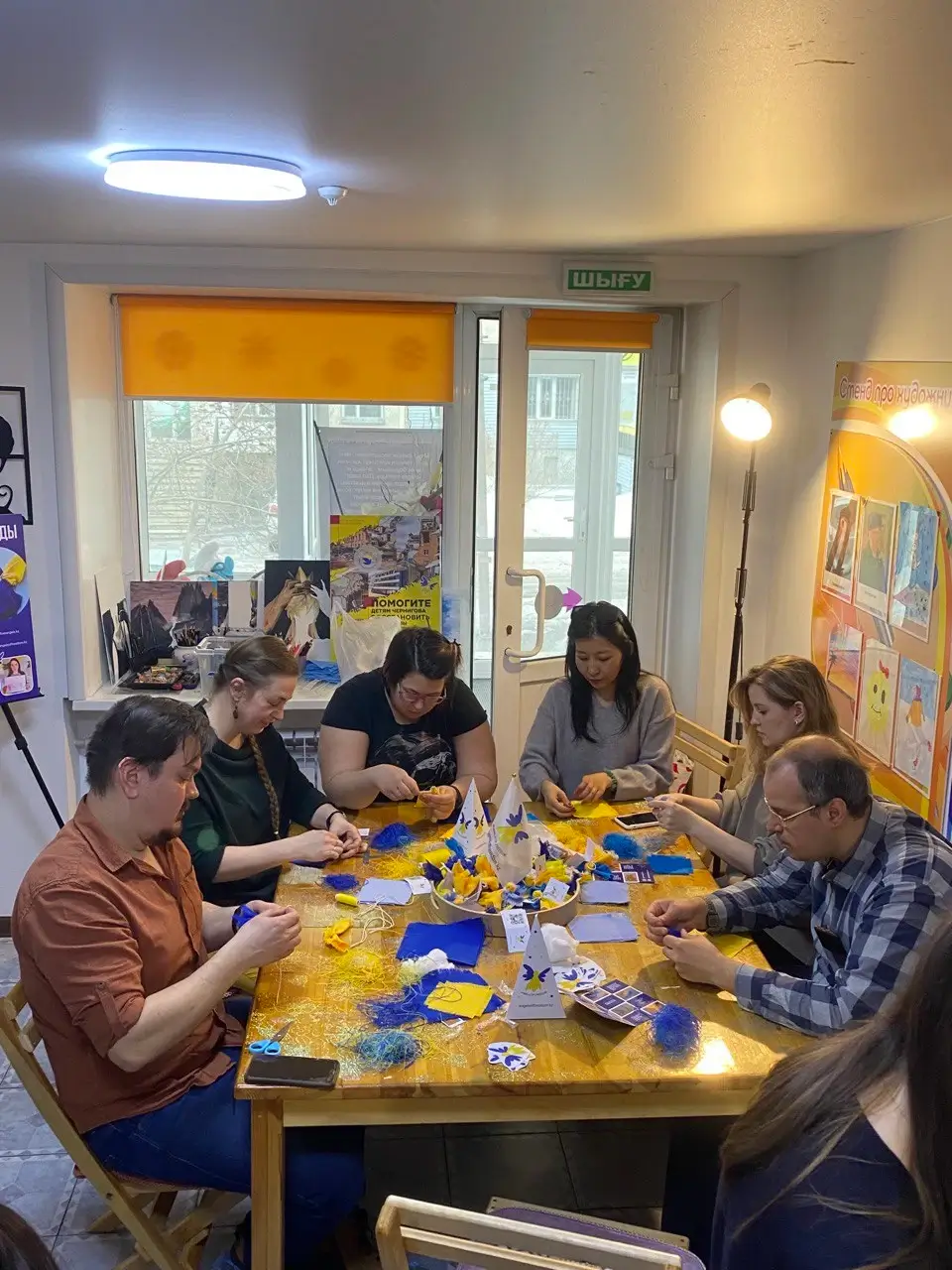
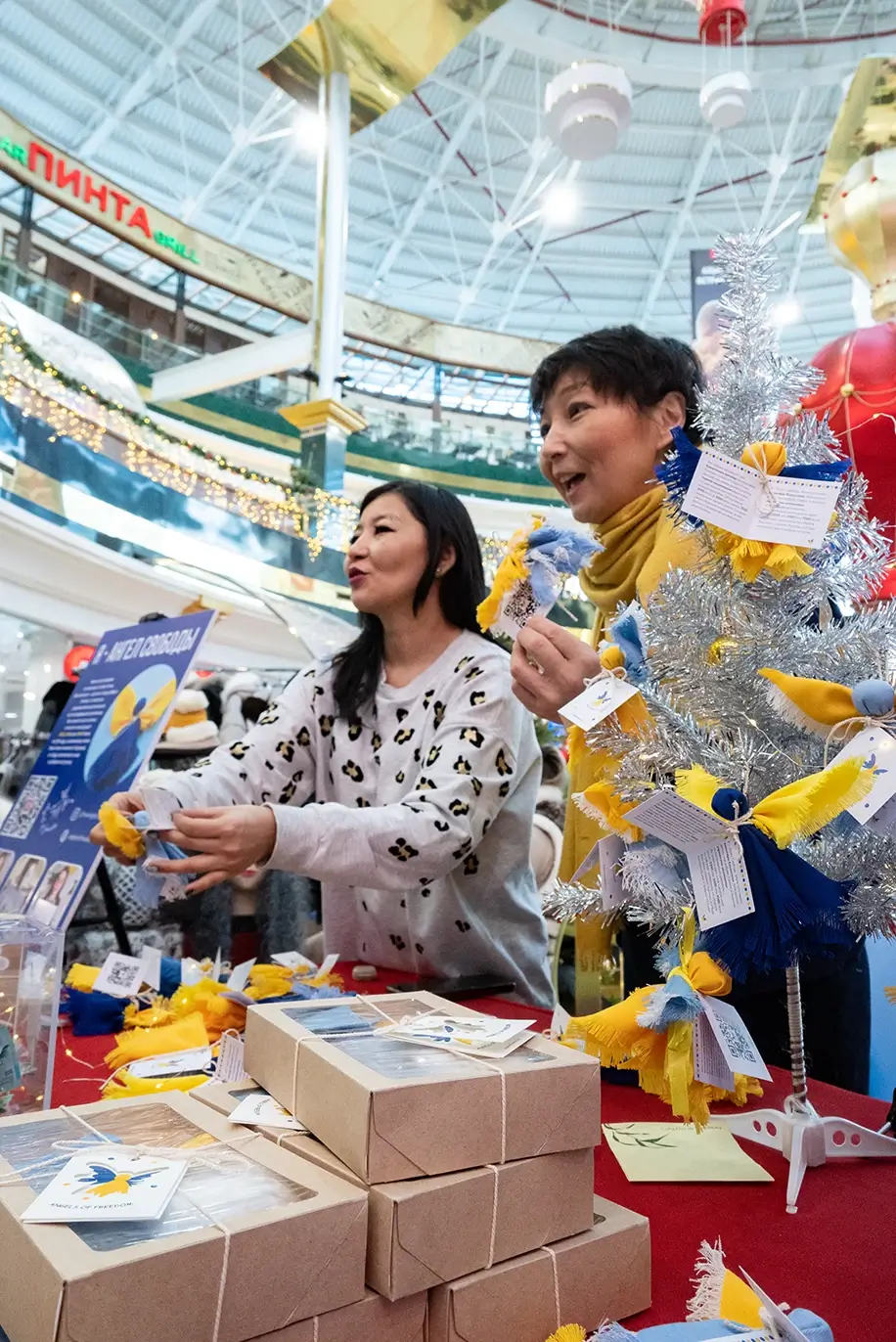
— What are the most common questions asked at the fairs?
— Not that questions are asked… More often than not, you see grateful people who also want to feel involved in something good. Little children come up and argue about who can donate more (smiles). Someone likes an “angel” — and you see those happy big eyes. And many adults say: “and we know you”, “we heard about you”, “and you also had a fair there”. Of the unpleasant ones, there were a couple of questions: “Why don’t you help Kazakh schools?” I understand why such questions are asked. So I either don’t answer, or I can answer that in Kazakhstan there is a peaceful sky overhead, and in Ukraine there is no peace. There is a big difference in that.
— Were there any participants at the fairs that you remember?
— I remember one grandmother. She was standing there in tears. She was so emotional, she felt so deeply… I wanted to hug her. She and I almost cried ourselves to death. And it’s very important that injustice makes people feel so strongly. Because there are few things worse than indifference. People with blank eyes, who have no attitude at all, as if this situation doesn’t exist, are the most frightening. I don’t think I could ever accept that.
— In your memory, what were the biggest donations?
— I think it was last November. I wasn’t at that fair. I don’t remember the exact amount, probably around 150–200 thousand tenge.
— How do people you know, those close to you, feel about your volunteering activities? Maybe they have seen you at fairs, approached to you?
— Seen at fairs, but not really approached to me. I share on Instagram about tolokas and fairs. Some people look at me closely, “so, what is she doing there, something strange.” Some, on the contrary, say, “Oh, cool!” Some, of course, feel tense.
— What is the tension related to?
— Maybe if I had initially come out with banners when the war in Ukraine broke out, it would have made sense for them. But here it turns out that a few months pass and only then do I get involved. Maybe this played a role…
With each “angel” that you make, you become more and more confident that you can help this world — make it a little brighter and kinder. The hope grows bigger with every angel. And it’s important to me that I am a part of it — at least a little bit, at least a part of me can be sent with an “angel.”
— It seems to me that after a year of war, support is needed even more than in the first weeks. Assemgul, how would you continue the phrase “The Angels of Freedom are…”?
— It is light, it is good, it is hope and faith. And sincerity. Those who come to us are very sincere people, very sincere.
— Do you perceive these “angels” as your guardian angels?
— Yes. By the way, there’s a little story about that. An acquaintance of mine got an “angel” for her brother. And he had a serious diagnosis. Brain cancer, if I’m not mistaken. And they were initially told that there would be an expensive operation. The acquaintance of mine took an “angel” with my mediation, and some time after that the diagnosis was alleviated a little. It turned out not to be so terrible. The next time we met, we hugged each other and she said to me: “Thank you, Assemgul, for the ‘angel’!” And I am truly happy for her, and I believe that “angels” can help people.
— In any case, they are definitely helping Ukraine — keeping Ukrainian children safe and free.
— Right.
